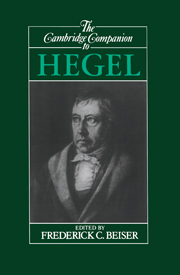Book contents
- Frontmatter
- Introduction
- 1 Hegel's intellectual development to 1807
- 2 You Can't Get There from Here
- 3 Hegel's conception of logic
- 4 Hegel's idealism
- 5 Hegel's dialectical method
- 6 Thought and being
- 7 Hegel's ethics
- 8 The basic context and structure of Hegel's Philosophy of Right
- 9 Hegel's historicism
- 10 Hegel on religion and philosophy
- 11 Hegel's aesthetics
- 12 Transformations of Hegelianism, 1805-1846
- 13 Hegel and Marxism
- 14 Hegel and analytic philosophy
- Bibliography
- Chronology
- Index
6 - Thought and being
Hegel's critique of Kant's theoretical philosophy
Published online by Cambridge University Press: 28 May 2006
- Frontmatter
- Introduction
- 1 Hegel's intellectual development to 1807
- 2 You Can't Get There from Here
- 3 Hegel's conception of logic
- 4 Hegel's idealism
- 5 Hegel's dialectical method
- 6 Thought and being
- 7 Hegel's ethics
- 8 The basic context and structure of Hegel's Philosophy of Right
- 9 Hegel's historicism
- 10 Hegel on religion and philosophy
- 11 Hegel's aesthetics
- 12 Transformations of Hegelianism, 1805-1846
- 13 Hegel and Marxism
- 14 Hegel and analytic philosophy
- Bibliography
- Chronology
- Index
Summary
In Hegel's view, Kant made an indispensable contribution to the progress of philosophy by recognizing that the most basic principles of human thought reflect the structure of our own minds. But, like Moses who could see but not enter the Promised Land, he failed to grasp the ultimate truth, understood by Hegel himself, that the nature of our own thought and that of the reality to which Kant always contrasted it are in fact one and the same. As he put it in the discussion of Kant in his Encyclopedia of Philosophical Sciences,
But after all, objectivity of thought, in Kant's sense, is again to a certain extent subjective. Thoughts, according to Kant, although universal and necessary categories, are only our thoughts - separated by an impassable gulf from the thing, as it exists apart from our knowledge. But the true objectivity of thinking means that the thoughts, far from being merely ours, must at the same time be the real essences of the things, and of whatever is an object to us.
(Encyclopedia, §4iz, pp. 67-68).- Type
- Chapter
- Information
- The Cambridge Companion to Hegel , pp. 171 - 210Publisher: Cambridge University PressPrint publication year: 1993
- 9
- Cited by

